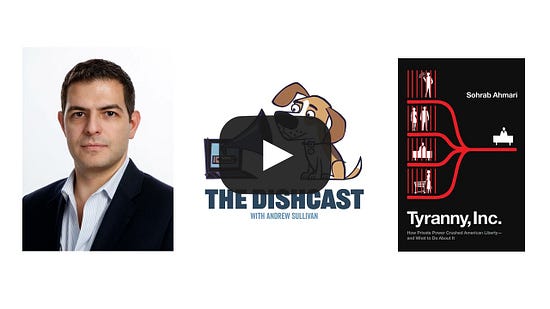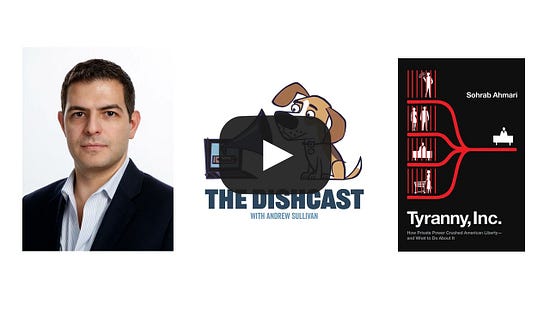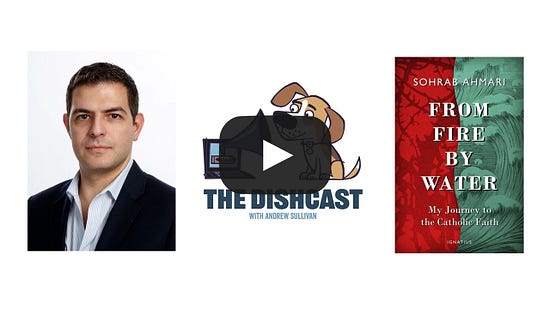Freddie is a writer and academic. He’s been a prolific freelancer at publications such as the NYT, the WaPo, Harper’s, The Guardian, Politico, and The Daily Dish. His first book was The Cult of Smart (reviewed on the Dish as “Bell Curve leftism”), and his new book is How Elites Ate the Social Justice Movement. You should also follow his writing on Substack. A longtime friend of the Dish, Freddie is someone I felt I knew from his writing. He’s somewhat different in person.
You can listen to the episode right away in the audio player above (or on the right side of the player, click “Listen On” to add the Dishcast feed to your favorite podcast app). For two clips of our convo — on the hypocrisy of helicopter parents on the left, and the relative evil of US foreign policy — pop over to our YouTube page.
Other topics: Freddie’s upbringing in NYC as a Red Diaper Baby; coming from a long line of communists; his father was a theater professor who took him to Indonesia; his mother, an environmental activist, died suddenly of brain cancer when he was 7; his father died of alcoholism when Freddie was 15; his bipolar diagnosis at 20; the shame of mental illness and Freddie eventually owning it publicly; his 2017 scandal that “killed my career for understandable reasons” and put him in a psychiatric hospital; the awful side effects of meds; Freud’s view of relative happiness; how performative identify politics is destroying the left; Freddie renaming BLM “Black Professional-Managerial Class Lives Matter”; the loss of black lives skyrocketing after the summer of 2020; how cops disproportionately protect black Americans; how we need better policing and more police; why cops need to do their job even in the face of stigma; how middle-class blacks are more advantaged than white counterparts, especially in academia; how elite colleges “harvest” rich blacks from other countries; how black communities had less crime and more nuclear families before the 1960s; how the introduction of crack and the Drug War in the 1980s exploited black neighborhoods; how the left sees success as zero-sum among the races; white people who denounce themselves; how black Dems have always been a conservative force within the party; the positive changes of MeToo; the online posturing of “MemeToo” and how it has no effect on street harassment; and the dishonest criticism of Freddie’s book by the WaPo.
Browse the Dishcast archive for another convo you might enjoy (the first 102 episodes are free in their entirety — subscribe to get everything else). Coming up: Vivek Ramaswamy on his vision for America, Leor Sapir on the treatment of kids with gender dysphoria, and Ian Buruma on his new book The Collaborators: Three Stories of Deception and Survival in World War II. Later on: Spencer Klavan, Martha Nussbaum, Matthew Crawford, David Brooks and Pamela Paul. Please send any guest recs and pod dissent to dish@andrewsullivan.com.
Here’s a listener on last week’s debate with Sohrab Ahmari over the free market:
Nice to have the Dish back after the summer break! So sorry about Bowie … such sad news. I enjoyed the podcast with Sohrab. He points to very real problems, and some of them (e.g. surprise agreements by which employees give up their rights) deserve straightforward government regulation.

But with respect to the bigger and deeper issues, I kept wondering: before we implement rigid restrictions like sabbatarian laws, or greatly enhance collective bargaining, couldn’t we consider market-based solutions?
For example, the power imbalance he describes between retail workers and their bosses is because of an oversupply of unskilled employees, which allows bosses to get away with paying their workers poorly and treating them terribly. Meanwhile, at least where I live, it’s nearly impossible to hire a plumber or any other skilled trade, because there are so few people working in those trades. If some of these retail workers learned trades, it would help rebalance both markets, and retail workers might have to engage in real negotiations with individual bosses about Sunday shifts, last-minute scheduling, etc. — and, of course, pay.
Now, it’s true that people have been talking about jobs programs and retraining for decades, and we still don’t do it well. But then, we also don’t do unions very well.
It seems like a combination of better industrial policy, immigration policy, and education policy might go just as far as Sohrab’s heavy-handed proposals, without leading to the kind of sclerotic and restricted economy in 1970s England that you described so accurately.
Another listener also “really enjoyed the episode with Sohrab”:
I have heard him making the podcast rounds over the past few weeks promoting his book, and I thought you did an excellent job pushing back on his claims that criticized our free market economy. I want to take issue with his characterization of the private equity business model, much of which was factually incorrect.

I am paraphrasing, but Sohrab said that “the model for private equity is to be willing to let nine portfolio companies fail, as long as one is a home run that returns the bulk of the investment for the fund.” This is not the model of private equity. This is the model of venture capital — a completely different asset class. Venture capital firms are not loading up the “real economy” with debt to extract value. They are making small, highly speculative moonshot bets in our innovation economy. Without venture capital, there would be no Facebook, Uber, or Tesla.
Yes, companies owned by private equity are ten times more likely to file for bankruptcy than companies that are not owned by private equity. However, private equity firms own approximately 16,000 companies, of which only 108 are expected to file for bankruptcy in 2023. This is a high number historically for the industry given the interest rate shock that the Federal Reserve has imposed on the economy the last 18 months. But this represents a 0.675% failure rate — hardly the 90% rate that Ahmari claims.
Obama used this issue to demagogue Romney in 2012. The Berniebro and Elizabeth Warren left have used these strawman arguments for years. Now it seems it is the postliberal rights turn.
It is funny that you never hear the critics mention KKR’s buyout of C.H.I. Overhead Doors in 2015. KKR made 10x their money, and all 800 employees received an equity stake that averaged $175,000, including hourly workers. This is a blue-collar, manufacturing, “real economy” business that Sohrab says is subject to “tyranny” from private equity and the free market.
Lastly, I agree that elites have discredited themselves over the last 40 years on the economy, foreign policy, and public health. I am not trying to carry water for the laptop class, but I think it is important that we have fact-based arguments before we follow the siren song of Marxism.
A listener dissents against me:
I agree with you on almost everything, but your failure to see the hold of Wall Street and big businesses on our lives at present is a bit disappointing. I think your objections or arguments against Sohrab’s thinking are based more on your experience growing up in the UK than the current state of the USA. Also, you are a privileged person who by definition has many more choices than millions of Americans. So your pushback against Sohrab was very political, but not adequately objective. You are a political elite and do not seem to recognize the problems of the average American.
If you liked last week’s episode, check out the other pod with did with Sohrab a year ago, on the “failures of liberalism.” A snippet:

This next listener “actually started to think differently about Sohrab based on your episodes with him”:
That said, I wished you had asked him who he will vote for, perhaps in spite of all his philosophical/policy economic stances. Based on your discussion, one would think he will not vote for Trump, but like most conservatives, it’s all talk until the election, when they go back to their original spots.
In that vein, I do wish you had challenged him when he mentioned Hawley, Vance, and Rubio in the same sentence with the word “hopeful. They’re part of the two-faced branch of GOP politicians who espouse all sorts of sensible things — until they decide their own re-election is what really matters and they need to grovel at Trump’s feet. (The Dems have their own branch too, such as Sinema and Manchin.)
Finally, I think you appeared too anti-union. ...






